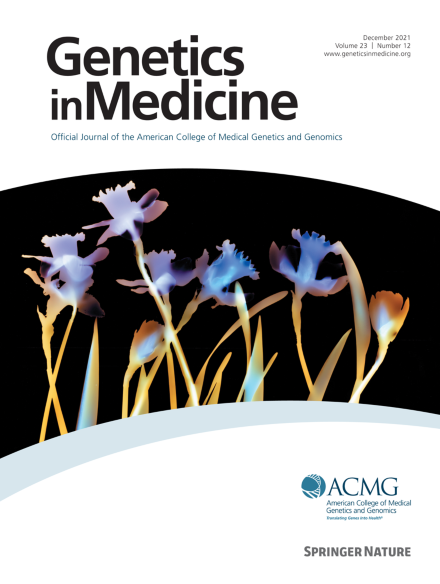以生物素酶缺乏为模型评估生殖载体筛选:变异鉴定、变异率和管理。
IF 6.6
1区 医学
Q1 GENETICS & HEREDITY
引用次数: 0
摘要
目的:回顾在一个大型、多样化的生殖携带者筛查(RCS)队列中发现的生物素酶基因(BTD)变异,并概述对具有致病性或可能致病性(P/LP)变异的杂合子的管理:这项回顾性观察研究包括 2020 年 1 月至 2022 年 9 月期间检测的 274 个基因面板样本。研究对象为 18 至 55 岁的女性。筛查采用新一代测序技术,覆盖外显子和 10 个碱基对侧翼内含子。计算了整个人群和个别种族/民族群体中 P/LP 变异的杂合子频率:在接受检测的 91,637 名妇女中,5,625 人(6.1%)的 BTD 存在 P/LP 变异。NM_000060.4:c.1330G>C p.(Asp444His)(简称 D444H 或 D424H)单独或与其他变异体结合,占阳性检测的 5193 例(92.3%)。不同种族和族裔群体的 P/LP 杂合子比率各不相同。我们发现了 7 个以前未在数据库中记录的新型 P/LP 变异:结论:通过 RCS 发现的 BTD P/LP 变异与通过阳性新生儿筛查发现的 P/LP 变异基本一致。因此,RCS 为早期诊断提供了可能。我们观察到不同种族和民族群体中生物素酶缺乏症的 P/LP 杂合子率存在明显差异。大多数报告的变异无需测定血清生物素酶活性即可解释。本文章由计算机程序翻译,如有差异,请以英文原文为准。
Evaluating reproductive carrier screening using biotinidase deficiency as a model: Variants identified, variant rates, and management
Purpose
To review biotinidase gene (BTD) variants identified in a large, diverse, reproductive carrier screening (RCS) cohort and outline management of heterozygotes with pathogenic or likely pathogenic (P/LP) variants.
Methods
This retrospective observational study included samples tested from January 2020 to September 2022 in a 274-gene panel. The study involved females aged 18 to 55 years. Screening was performed using next-generation sequencing covering exons and 10 base-pair flanking introns. The heterozygote frequency was calculated for P/LP variants for the entire population and individual racial/ethnic groups.
Results
Of the 91,637 women tested, 5625 (6.1%) had a P/LP variant in BTD. NM_000060.4:c.1330G>C p.(Asp444His) (referred to as D444H or D424H) alone, or in combination with another variant, accounted for 5193 (92.3%) of the positive tests. P/LP heterozygote rates differed between racial and ethnic groups. We ascertained 7 novel P/LP variants not previously recorded in databases.
Conclusion
The BTD P/LP variants identified through RCS were substantially compatible with those found through positive newborn screening. Therefore, RCS provides a potential for earlier diagnosis. We observed significant differences in P/LP heterozygote rates for biotinidase deficiency among different racial and ethnic groups. Most reported variants can be interpreted without requiring determination of serum biotinidase activity.
求助全文
通过发布文献求助,成功后即可免费获取论文全文。
去求助
来源期刊

Genetics in Medicine
医学-遗传学
CiteScore
15.20
自引率
6.80%
发文量
857
审稿时长
1.3 weeks
期刊介绍:
Genetics in Medicine (GIM) is the official journal of the American College of Medical Genetics and Genomics. The journal''s mission is to enhance the knowledge, understanding, and practice of medical genetics and genomics through publications in clinical and laboratory genetics and genomics, including ethical, legal, and social issues as well as public health.
GIM encourages research that combats racism, includes diverse populations and is written by authors from diverse and underrepresented backgrounds.
 求助内容:
求助内容: 应助结果提醒方式:
应助结果提醒方式:


